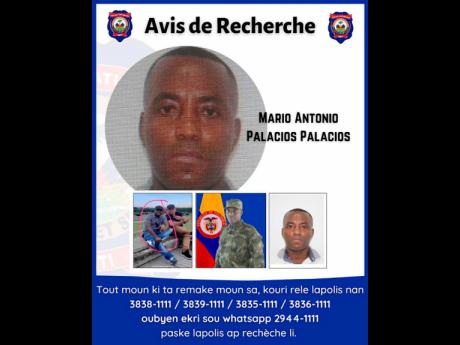Moise murder suspect to be sent to Colombia
Absence of extradition treaty preventing Ja from handing over ex-army man to Haiti
Jamaica is again moving to enforce the court-ordered deportation of ex-Colombian army officer Mario Antonio Palacios Palacios, a key suspect in the July assassination of Haitian President Jovenel Moise, to his homeland.
This development comes despite a request by Haiti, through diplomatic channels, to have Palacios turned over to authorities there, according to a document seen by The Sunday Gleaner.
Palacios remained in local police custody up to yesterday, almost one month after he was fined $8,000 or five days in prison by a Parish Court judge who also ordered his deportation for illegally entering the island.
Plans for what was expected to be a routine deportation were, however, scuttled after the high-profile target in one of the hemisphere’s most notorious modern murders became the subject of a Red Notice issued by the International Criminal Police Organisation (Interpol), sources told The Gleaner at the time.
But Jamaica’s Deputy Police Commissioner Fitz Bailey confirmed on Thursday that the “administrative process” surrounding Palacios’ deportation is now in train.
That process includes obtaining travel and other official documents for the ex-Colombian army officer, Bailey explained.
“That process is going on,” he said.
Days after the October 15 court order for Palacios’ deportation, Haiti’s Foreign Ministry dispatched a letter to Jamaica’s Foreign Minister Kamina Johnson Smith requesting that the Colombian be handed over to Haitian authorities, according to documents seen by The Sunday Gleaner.
REQUEST FOR TRANSFER
“The Chancellery hereby formally reiterates its request to the Jamaican Commonwealth Government that Mr Palacios Palacios be transferred to Haiti and be made available to the Haitian judicial authorities leading the investigation,” read the October 28 letter, inter alia, referring to the probe into Moise’s assassination.
The letter indicated, too, that Haiti’s Foreign Minister Claude Joseph raised the issue with Johnson Smith during bilateral talks on the sidelines of the 10th Italy-Latin America and the Caribbean Conference in Rome last month.
Up to press time, Jamaica’s foreign affairs ministry had not responded to Sunday Gleaner questions sent to Delona Flemming, director of public relations and media affairs.
Jamaica does not have an extradition treaty with Haiti, and that may be among the issues complicating the handling of Palacios’ removal from Jamaica, multiple sources suggested.
The Haitian foreign ministry also wrote to the Colombian Government urging its “cooperation” to ensure Palacios is turned over to judicial authorities in Haiti who are leading the investigation into Moise’s assassination.
The Sunday Gleaner submitted questions to the Colombian Embassy here, but there was no response up to late yesterday.
In the aftermath of Moise’s July 7 assassination, Haitian police arrested 20 persons, including 18 Colombians and two Haitian Americans. They were suspected of being among the 28 commandos who stormed the late president’s private residence in the hills overlooking the Port-au-Prince capital, killing him and wounding his wife, Martine.
Three suspects were reportedly killed, while five, including Palacios, were on the run.
Palacios was arrested at a guest house in central Jamaica in October, the police have confirmed.
It is believed that he entered the country through one of the island’s more than 140 informal ports of entry.

